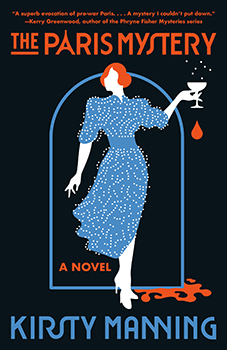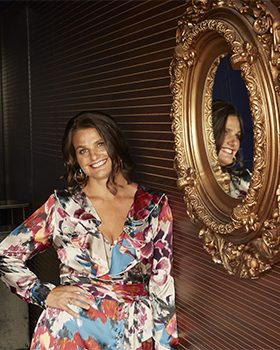

Features Kirsty Manning
Escaping to Paris Can Lead to Murder
In her newest historical novel, THE PARIS MYSTERY, bestselling author Kirsty Manning transports readers to 1938 France, where the specter of war creeping along the edge of Parisian society does little to dampen their enthusiasm for couture fashion, outlandish parties, or newsworthy murders.
After months in lockdown, Manning realized she needed to “write herself happy” and escape reality by writing “herself into another place.” She turned to the City of Light, a place she has traveled to many times and has given her endless joy.
Manning began imagining her readers picking up her book. She wanted them to experience “all the feelings” and to “taste Paris, smell it, and feel it.” Mission accomplished.
For her intrepid, globe-trotting protagonist, Charlie James, Manning drew inspiration from her real-life pal and Emmy-award-winning journalist Sara James and pioneering war correspondents like Louie Mack and Dorothy Lawrence.
As the clock ticked closer to midnight, Australian author Kirsty Manning sat down with The Big Thrill to discuss THE PARIS MYSTERY, writing tips, and her favorite places to travel.
Give us a quick summary of THE PARIS MYSTERY.
An Australian journalist is posted to Paris and assigned to cover the society pages during pre-war Paris. While she’s attending the Circus Ball, someone is murdered, and she decides to hunt down the killer.
Did you have any goals for this book?
I set a personal challenge to write a sexy, joyous Agatha Christie-style story set in Paris, but with more food and wine. I hope readers sit down with their drink of choice, relax, and go on a journey.
Having worked murder investigations before, Charlie understands the value of building a trusted team in her new home. Right away, she senses Violet is someone she can depend on.
Charlie is from a middle-class background and, as a journalist, she’s not wealthy. I had to enlist the help of various friends and invent characters with couture who could help Charlie navigate Parisian society.
Violet is Charlie’s glamorous colleague. Women in 1938 could work, but it was difficult to remain employed once they were married. I loved the fact that Violet is this massively well-educated woman who speaks six-and-a-half languages. She’s so much smarter and sassier than the men she assists at the newspaper. That constant underestimation turns out to be her great strength.
George, Charlie’s boss, is another wonderful character. Did you model him after anyone?
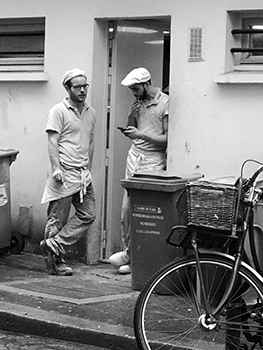
It’s moments like this—a quiet pause in a back alley—that give THE PARIS MYSTERY texture and colour.
Yes, did. I used to work as a freelance journalist and also in book publishing. I’ve had many bosses who are encouraging, but leave you to get on with the job. You’d be craving feedback on interviews or how you did the setting or you just want them to give you time. But they’re busy people and don’t have the time. So instead of feedback, I’d get, “Good. Thanks. Got it.” In my book, I wanted to capture that gruffness and George’s growing appreciation of Charlie James.
Back to building relationships…Charlie did a masterful job earning the inspector’s trust.
Journalists have a delicate balance between getting the story and nurturing trust with their sources. It’s a crucial balancing act. Journalists and police never seem to work comfortably side by side. But they’re necessary. The police need journalists to report accurately. There’s always a push-pull relationship.
I really wanted to write Inspector Bernard, who is so French. In one scene, Charlie went to his office to speak with him about the murder investigation, but he was on his way to lunch. He agreed to discuss it with her—at the bistro—while enjoying a glass of wine and proper bread. I had a lot of fun playing with that.
How unusual was it for a single woman to travel so far (Australia to France) by herself in 1938?
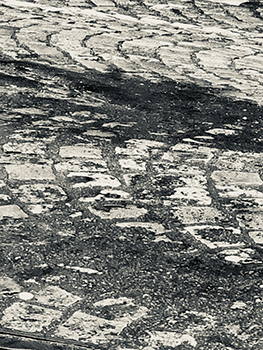
The cobblestones…tricky to navigate in heels but somehow the French ladies seem to nail it. Sneakers only for me!
Not as unusual as you would think. Australians have always been quite hearty travelers because it’s such a commitment to get anywhere. Charlie’s mother was French, so she grew up speaking the language and didn’t consider France as a foreign country. While that kind of long-distance travel by ship wasn’t usual, it wasn’t unheard of.
There’s a long history of people going to Paris in that era—Hemingway, Gertrude Stein. It was that real heyday of writers being in Paris, moving there because they could be who they wanted to be. They could write the words they wanted to write. Have the lovers they wanted to love. It was a city of great freedom. Freedom of words. Freedom to be the people they needed to be, to become great writers. I wanted to capture that on the page. The sense that you could reinvent yourself in Paris. If you’ve been lucky enough to visit Paris, you know we all do it a little: We all stand a little taller and dress a little better. It’s the dream, right? It was then, and it is now.
Your descriptions of Paris—the cafes, the fashion, the parties—really made the city come alive.
Setting has always been a very big part of writing my books. In any kind of great murder mystery, whether it’s set in New York or Scandinavia or Australia, like Jane Harper’s books, place is always so important. I really wanted to paint Paris as a character. I wanted to give readers the joyous experience on the page because I love it when I delve into a book and somebody does that for me.
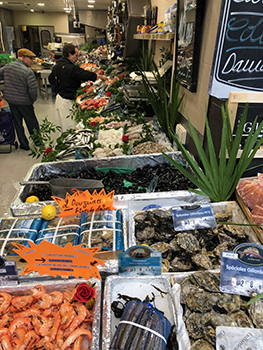
Food glorious food. No trip to Paris is complete without a visit to the markets and a classic bistro.
Traveling to Paris is something you’ve done often. What draws you back to the City of Light, again and again?
My husband and I own a wine bar, and we import a lot of wine from Europe. Paris has been a familiar stomping ground for much of my adulthood. The city has evolved over the years. Paris is one of those cities that is at once comforting with its familiarity—great food, pristine hedging, Haussmann-style buildings, grand boulevards, seasonal tulips in the gardens, plane trees, the nonchalance of the women, and the flirty way of the men. It’s all absolutely wonderful. Every time is magical.
Do you have a craft tip to share?
Writing is a verb. You can’t edit words you don’t have. Quell the negative self-talk. Keep going. Read widely.
What are some of your favorite places to travel and why?
Paris—for the food and fashion; Southern France—for the light, balmy warmth, clear water, beautiful seafood, and wine.
Will we see more of Charlie in the future?
There are many more Charlie James stories to come.
- The Big Thrill Recommends: THE COLDEST CASE by Tessa Wegert - November 15, 2024
- Shari Lapena by Tracey Devlyn (VIDEO) - October 27, 2024
- Jeff Circle By Tracey Devlyn (VIDEO) - October 11, 2024

